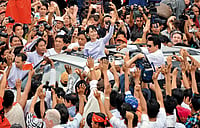Union external affairs minister Salman Khurshid was so impressed with Beijing that, after his recent visit, he gushed to reporters, “I’d love to live in Beijing.” Beijing is a world-class city, and maybe he was only complimenting his hosts. But what would happen if he really had to live in Beijing? Assume that Khurshid, who is 60, manages to land a job. His Indian and Oxford qualifactions would be useless, and as he doesn’t know Mandarin, he may only get unskilled work. The statutory minimum wage in Beijing is 1,400 renminbis. If his wife also worked, they’d earn 2,800 renminbis. What could they do?
They wouldn’t be able to live in the city centre, paying 4,455 renminbis (the average figure) in monthly rent. Living in the outskirts, paying 2,650 renminbis in rent, they’d be left with 150 renminbis for everything else. This won’t pay even their utility bills, at some 400 renminbis per month for an 85 square metre flat.
For eating out, they’ll have to explore the cheap restaurants flanking Beijing Central railway station. Even that would leave them poorer by 30 renminbis each. A three-course meal in a mid-range restaurant would be 150 renminbis per person and, therefore, out of bounds. A combo meal at McDonald’s, however, would be 25 renminbis. Domestic beer at 10 renminbis a pint or a cappuccino at 25 renminbis would be best avoided.
Should they cook at home, they’d have to pay 13 renminbis for a loaf of bread, seven renminbis for a kilo of rice, 10 renminbis for a dozen eggs, 30 renminbis for a kilo of chicken breast, 5 renminbis for a head of lettuce, nine renminbis per kilo for tomatoes and eight for potatoes. They’d find it difficult to buy fruit—apples are 12 renminbis a kilo, oranges 14. They can forget about wine—a bottle of mid-range local wine is 100 renminbis. Alas, a car—a Volkswagen Golf or equivalent—would be outside their reach at 1,52,500 renminbis. They couldn’t take taxis—the meter starts at 11 renminbis and then it is two per kilometre.
A bus or the metro to work would be two renminbis per trip. A monthly pass costs 120 renminbis. They wouldn’t be able to join a health club (500 renminbis per month) or play tennis (120 renminbis for an hour on weekends). They wouldn’t be able to watch any international films released in Beijing at 80 renminbis per seat.
The Khurshids would have a very basic wardrobe with a pair of jeans (Levi’s 501 or something similar) at 800 renminbis and a woman’s summer dress at a chain store like Zara and H&M at about 485 renminbis. A pair of leather shoes for Salman would be 750 renminbis, sports shoes at 800. His pocket would prevent him from even haggling for fake branded clothes with the Silk Street sharpsters.
They wouldn’t be able to subscribe to internet services at 120 renminbis per month. They could barely afford a pre-paid mobile at 0.3 renminbis per minute for local calls. If they managed net access somehow, they’d find social media sites blocked and would have to use heavily monitored Chinese equivalents Weibo, Renren or YouKu—if they manage to teach themselves some Mandarin.
If the Khurshids wanted to be promoted at work, party membership would help—although it is a bit late in the day for them to join the Communist Party. Unhappy with their lives, they wouldn’t be able to protest publicly—the last time the Chinese protested was in Tiananmen Square and they were massacred.
On the other hand, in India, Khurshid’s family has been part of the ruling classes for three generations now. As a cabinet minister, he earns Rs 50,000 per month as basic salary, a daily allowance of Rs 2,000; a constituency allowance of Rs 45,000 per month and a sumptuary allowance of Rs 1,000 per month—along with a free spacious bungalow with free electricity, water and telephones (but metered gas); a fully furnished residential office on which he can spend Rs 3 lakh for furnishing; unlimited official travel by air and train; 48 personal air tickets a year and free security. When he is out of power, his income shoots up as a practising lawyer. While Chinese television won’t even bother with him, in India, he’s always on TV. If all else fails, there’s Farrukhabad. Why then, to borrow a phrase, choose to be the bread crumb of Beijing when you can be the toast of India?
(The writer was recently in Beijing. He enjoyed being in the city, but certainly does not want to live there.)


























